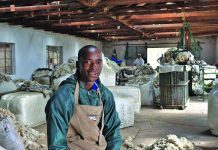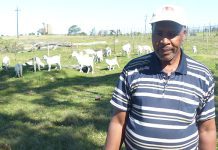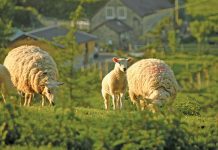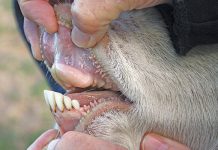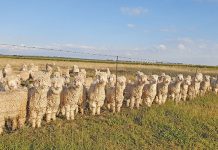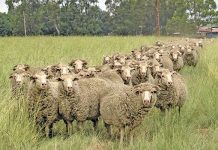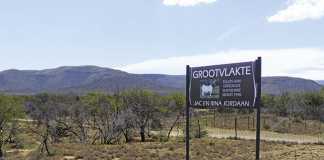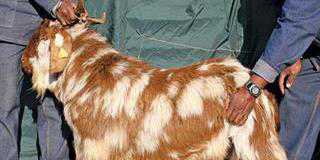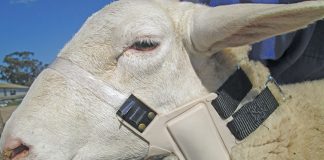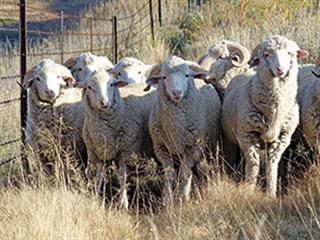
“If you look after your Merino, it will never drop you.” This is the simple reason the Nel family has farmed Merinos in the mountains and river valleys of the Barkly East district for close to four generations, says Stefan Nel, 46. Merinos are part of the Nels’ way of life, and Stefan’s son – Stefan Jnr, who is still in high school – plans to farm with his father and contribute to the future legacy of Bergplaas Merinos. “I’m very lucky,” says Stefan. “He’s interested in the sheep and wants to come and farm.”
A history of merinos
The first rams to be used on the 200 Merino ewes registered by Frikkie Nel in the mid-1930s were acquired from the Southeys and Minnaars of the districts of Middelburg and Graaff-Reinet in the Karoo. Frikkie’s unshakeable belief in the value of producing quality Merino wool was richly rewarded during the famous wool boom of the early 1950s that made many farmers wealthy. New sheds and homes were built during this period, and sheep farming operations in districts such as Barkly East expanded.
By the late 1960s, the Nels were farming on seven farms and shearing 6 000 sheep a year. However, by the time Stefan’s father Dawie took over the management of Bergplaas Merino Stud in 1982, the Nels’ Merino-type were being bred to ensure efficient mutton production to better handle depressions in the wool market. Today, the heavily fleeced and pleated Bergplaas Merino rams of the 1960s and 1970s – once so proudly photographed on the lands along the Langkloofspruit – have been replaced by a more open-bodied, dual-purpose sheep.
“We strive for balance in a ram,” says Stefan. “He must have wool and meat, a medium/strong wool ram with good conformation.” According to Stefan, his father has always maintained that a stud breeder’s primary aim should be to subtly adapt his selection processes to market demands.
Re-defining the Bergplaas Merino
Stefan returned to the farm soon after matriculating in 1988 and in 2000 officially took over the management of the Bergplaas Merino Stud. He says that actively farming with his father in the 1990s allowed him to absorb and share his passion for Merinos. It also helped him to understand his father’s long-term vision of breeding a Merino defined by a favourable economic balance between wool and mutton production.
“I realised I should stick to the type my dad was aiming to breed and keep our clients happy,” he explains. As examples, Stefan mentions the rams of two breeders that made significant genetic contributions to the Bergplaas flock during the 1990s. These breeders were Alberto Geldenhuys of Colesberg in the Northern Cape (two of his flock were SA Champion Merino rams) and Eddie Prinsloo of Smithfield in the Free State.

Stefan (right) and his father Dawie after a successful day at the Elliot Agricultural Show. “He’s very happy about what I’m doing with the stud,” says Stefan. Photo courtesy of the Nel family.
Stefan continues to source rams from Eddie and has recently begun purchasing rams from the Van Pletzen family in the Jamestown district of the Eastern Cape. The Bergplaas stud flock produces on average 5kg of wool per sheep, while the wool clip averages a fibre diameter of 21 microns. Shearing takes place in October, with shearers sourced from BKB. Stefan says the potential of Bergplaas Merino ewes to produce outstanding fat lambs is illustrated by 150 commercial ewes mated to Dormer rams that produce fat lambs off the veld at an average weight of 37kg.
Breeding
The 350 Bergplaas Stud Merino ewes and 800 commercial ewes are run on the veld throughout the year and receive only salt. Two months before lambing in August/September, ewes are given extra feed, including lucerne (produced on 20ha). They lamb mostly on about 100ha of green feed grown in the fertile dark soils of the river valleys of the Barkly East region.
Two-hundred of the stud ewes are artificially inseminated – laparoscopically – and lamb in lambing pens, while the remaining stud ewes are mated to selected Merino rams.
About 40 rams are marketed each year and semen is harvested from any outstanding rams that are to be sold. Up to six Merino rams are kept back to use in the Bergplaas flocks. All the ewes in the commercial flock – except for 150 that are mated to Dormer rams in a terminal cross-breeding programme – are mated to Merino rams, with offspring being sold as wethers or replacement maiden ewes. The average lambing rate for both flocks is 140%.
Successful production sale
Stefan has marketed Bergplaas rams at various sales over the years, including the Barkly East Prestige Ram Sale. This year he hosted the first Bergplaas Production Sale on Prospect, offering 40 rams and 40 ewes (Jamestown Merino breeder Jannie de Villiers contributed 10 of the 40 rams). Stefan admits to feeling jittery on 23 January while waiting for prospective buyers to arrive. His anxiety proved unfounded, however; not only were all sheep on offer sold, but the three top-priced Bergplaas Merino rams sold for R30 000, R22 000 and R19 000.
The average ram price was R8 000, while the 40 ewes averaged R11 000. Stefan hopes to put 50 rams on offer next year and as many as 60 at the 2015 sale. It comes as little surprise that Bergplaas Merinos are regular achievers at local Eastern Cape shows in towns such as Barkly East, Elliot, Lady Grey and Jamestown. However, it is Bergplaas Merino’s national achievements for wool and conformation that have best demonstrated the exceptional dual-purpose genetic quality of the flock.

The Bergplaas Merino Stud produced this SA Reserve Champion fleece in 2006. Here a proud Stefan and his two children Stefan jnr and Christi admire the fleece.
In 2006 a Bergplaas Merino produced the Champion Fleece in the class 20,6 micron to 22 micron at the Merino Classic National Fleece Competition in Graaff-Reinet, and the fleece was also eventually announced as the SA Reserve Champion Fleece. In 2009, a seven-month- old Bergplaas Merino ram, Rocky, was crowned the SA Grand Champion Veld Merino Ram at the Merino Classic held in Middelburg in the Eastern Cape. And at the same event, the Bergplaas Merino Stud produced an SA Grand Champion Merino Ewe Lamb.
These achievements indicate how respected Bergplaas Merinos have become beyond the borders of the Eastern Cape.
Contact Stefan Nel on 045 971 9053.

